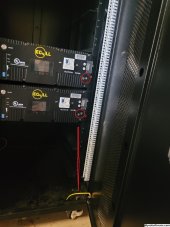Just wanted to ask if people earth their rack batteries and the cabinet??
my rack batteries have a earth threaded hole, with the earth logo on the front face of the batteries, and the rack has a earth block,
only on all the you tube videos, I don't see no one earthing there's
I was thinking to connect each battery (ie its metal body) via the screw on the front face showing the earth logo, all to the rack cabinet earth bus and then one earth to a ground spike.
is this needed???
my rack batteries have a earth threaded hole, with the earth logo on the front face of the batteries, and the rack has a earth block,
only on all the you tube videos, I don't see no one earthing there's
I was thinking to connect each battery (ie its metal body) via the screw on the front face showing the earth logo, all to the rack cabinet earth bus and then one earth to a ground spike.
is this needed???



